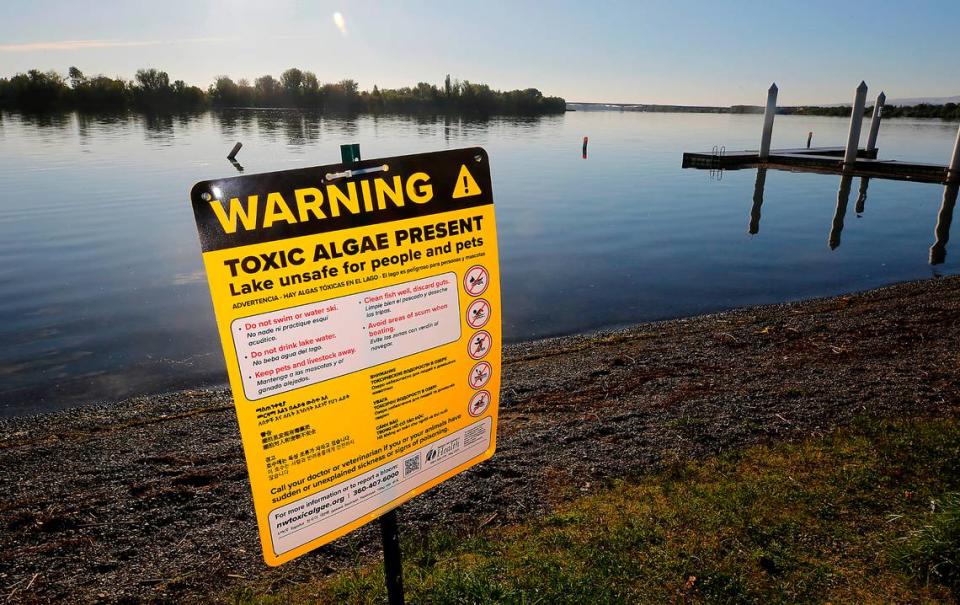Safety Alert | Dog’s death likely linked to toxic algae along Tri-Cities river shore
A dog died this week after spending time at the Columbia River in the Tri-Cities before increased toxic algae blooms were reported, according to the Benton Franklin Health District.
“The death of this beloved pet is still under investigation,” the district said. “But out of an abundance of caution, we are taking swift action to prevent further fatalities.”
It is urging residents to closely monitor their young children and pets along the river shoreline. They are most at risk from the toxin found in the river.
Sampling has detected extremely high concentrations of a cyanotoxin in clumps of algae, the district said. Some samples showed a type of cyanotoxin — anatoxin-a, which attacks the nervous system — at levels 50 times higher than in surrounding water.

What is commonly called toxic algae, or blue-green algae, is bacteria which have some of the characteristics of plants and produce toxins.
The health district reported this week that preliminary tests of river water samples at Wade Park in Pasco and Leslie Groves park in Richland had raised concerns and that toxic algae also was suspected at Columbia Point in Richland.
In mid-August the Howard Amon swim beach in Richland tested positive for anatoxin-a and signs have been posted since then warning people not to swim there or let their pets in the water.
Stay out of the water at sites posted with a yellow warning or red danger signs, says the health district. But residents also should be cautious elsewhere along the shoreline of the Columbia River in the Tri-Cities area, it said.
It recommends preventing dogs from eating or chewing on clumps of algae.
They should not lick their fur if they have been in the river, and they should be rinsed with clean water after playing in the river.
People also should rinse their hands and any exposed skin after touching a dog that has been in the water.

If a pet becomes ill after exposure to river water, the owner should call a veterinarian immediately. Any suspected cyanotoxin poisonings should be reported to the Benton Franklin Health District at 509-460-4205.
Symptoms from ingesting contaminated water can appear in people and animals as soon as 15 to 20 minutes, depending on the size of the person or animal and the amount of the toxin. A dog may die within minutes to days of exposure, according to the Centers for Disease Control and Prevention.
Exposure in animals may result in weakness, staggering, difficulty breathing, convulsions and death.
Two summers ago several dogs who had played in the Columbia River in Richland and just upstream died, and sampling of river water showed the same cyanobacteria as found this summer.
In people, signs may include numbness of the lips, tingling in fingers and toes, and dizziness. They should seek medical help.
People catching fish in areas with a major toxic algae bloom, should be aware that neurotoxin present there may accumulate in the liver, kidneys and other organs of fish. They should remove the internal organs, which may contain more of the neurotoxin, and consider not eating the fish.
The Tri-Cities municipal governments have treatment processes to neutralize the toxin in drinking water.
The health district will leave signs up along the Columbia River shoreline until two weeks of testing produce results below the danger threshold.


